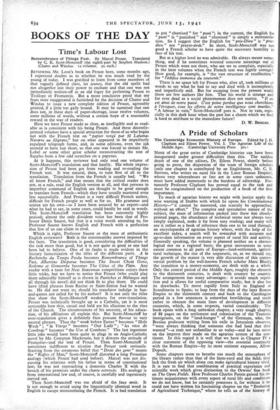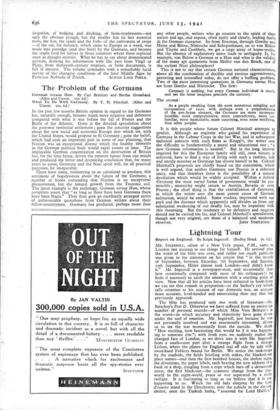A Pride of Scholars
The Cambridge Economic History of Europe. Edited by J. H. Clapham and Eileen Power. Vol. 1. The Agrarian Life of the Middle Ages. (Cambridge University Press. 3os.)
NONE of the great series of Cambridge histories can have been inaugurated under greater difficulties than this. The sudden death of one of the editors, Dr. Eileen Power, shortly before going to press, the dispersion of the team of foreign scholars (only one chapter is contributed by an Englishman, Mr. C. E.
Stevens, who writes on rural life in the Later Roman Empire), whose very whereabouts or fate are in some cases unknown, must have added immensely to the burdens of editorship. For- tunately Professor Clapham has proved equal to the task and must be congratulated on the production of a book of the first importance.
To much of agrarian history we might with justice apply the wise warning of Stubbs with which he opens his Constitutional
History—" it cannot be mastered, can scarcely be approached,
without an effort." The complex and speculative nature of the subject, the mass of information packed into these 600 closely- printed pages, the abundance of technical terms not always very simply explained, make it far from easy reading; and many will use it rather as a book of reference than one to be read through, an encyclopaedia of agrarian history where, with the help of the excellent index, a search will be rewarded with accurate and up-to-date information on every aspect of rural life and activity.
Generally speaking, the volume is planned neither on a chrono-
logical nor on a regional basis; the great movements to some extent common to all parts of Europe—land-settlement, agricul- tural technique, the rise of the seigneurie, or, as we should say, the growth of the manor (a very able discussion of this contro- versial problem by the well-known French scholar Marc Bloch), the transition to a money-economy, are dealt with as a whole. Only the central period of the Middle Ages, roughly the eleventh to the thirteenth centuries, is dealt with country by country. The arrangement has many advantages: it avoids much repeti- tion and it allows for useful comparative study; but it also has its drawbacks. To move rapidly from Italy to England or Scandinavia to Spain; to leap from the days of the later Roman Empire to the thirteenth century and back to the Carolingian period in a few sentences is somewhat bewildering and tends rather to obscure the main lines of development in different countries, which, in some respects, varied considerably. The book opens with a long unbroken chapter, a very tough chapter, of 88 pages on the settlement and colonisation of the Teutonic immigrants, on the "land-hunger" of the Germans, who, the Breslau professor writing from his exile in Jerusalem observes, " were always thinking that someone else had land that they wanted "—a trait not unfamiliar to us today—and he lays stress on the impress they made on the agrarian system of the con- tinent. In this regard it is well that we have in Chapter IV a clear statement of the opposing view—the essential continuity with the Roman Empire—by its most eminent exponent, Alfons Dopsch.
Some chapters seem to breathe too much the atmosphere of the library rather than that of the farm-yard and the field; they lack the fresh air which alone can make agricultural history vivid. It is rare to find that combination of practical experience and scientific work which gives distinction to the Orwins' fine book on The Open Fields. How Professor Charles Parain gained his in- timate acquaintance with every aspect of rural life and conditions we do not know, but he certainly possesses it, for without it he could not have written his fascinating chapter on the " Evolution of Agricultural Technique," where he tells us of the history of
irrigation, of hedging and ditching, of farm-implements—not only the obvious plough, but the smaller but no less essential tools, the hoe, the spade and the fork—of the cultivation of crops —of the oat, for instance, which came to Europe as a weed, was made into porridge (and also beer) by the Germans, and became the staple food for horses in those countries where these replaced oxen as draught animals. What he has to say about domesticated animals, drawing his information with like ease from Virgil or Pliny, from thirteenth-century treatises, or from documents, is full of interest. The volume concludes with a remarkably lucid survey of the changing conditions of the later Middle Ages by



























 Previous page
Previous page